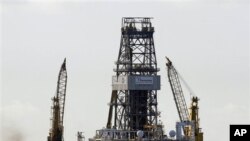An electronics technician who was aboard the ill-fated Deepwater Horizon oil rig says an system that could have alerted workers to a deadly buildup of gas was partially disabled the day the rig exploded in April.
Technician Mike Williams made the comment Friday during testimony before U.S. investigators in the Gulf Coast state of Louisiana. Williams, who worked for rig owner Transocean, said he was told the system was disabled because rig managers did not want false alarms waking people at night.
Williams - who has filed a lawsuit against Transocean - said a sensor was functioning at the time but was not set to ring an alarm in emergencies.
The technician testified at a hearing on what caused the April 20 blast on the rig that claimed the lives of 11 workers and triggered the massive oil spill in the Gulf of Mexico.
Transocean said in a statement obtained by the Reuters news agency that the rig had hundreds of individual fire and gas alarms, all of which were tested, in good condition, not bypassed and monitored from the bridge.
On Thursday, The New York Times reported that workers on the rig expressed concerns about safety practices and feared punishment if they reported mistakes or problems. The paper said a worker survey and an equipment safety report, both completed before the explosion, highlighted safety problems aboard the rig.
It said the equipment assessment by risk management agency Lloyd's Register Group found at least 26 components and systems on the rig that were in "poor" or "bad" condition.
A Transocean spokesman was quoted as saying most of the components that were listed in poor condition were minor.
On Wednesday, the federal hearings in Louisiana on the cause of the spill were canceled when four witnesses from Transocean announced they would not testify.
Some information for this report was provided by AP, AFP and Reuters.




